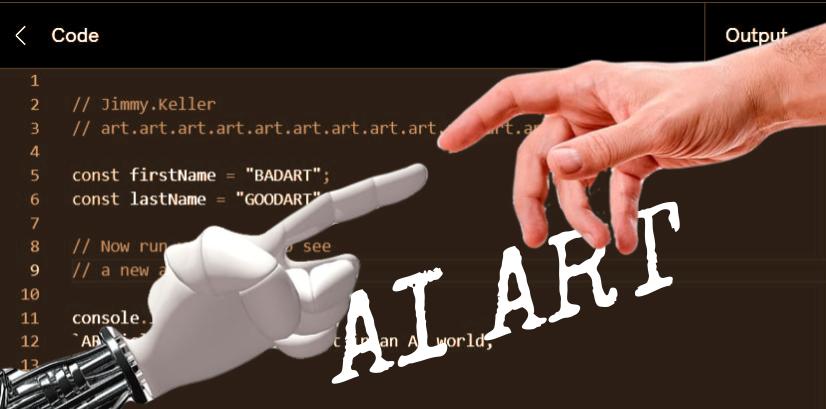JIMMY KELLER
Special to The Leader

Graphic by JIMMY KELLER | Special to The Leader
Artificial intelligence (AI) isn’t something of the future — it is the present. It’s beginning to take over many sectors of our everyday lives and growing at a rate that tech innovators Elon Musk and Steve Wazniak describe as risky. Just like art, the tech industry is constantly morphing into tomorrow’s ideas.
AI “art” is art. We can go down the centuries long rabbit hole of what constitutes art or we can accept the notion that even computers can create visually intriguing, intellectual based pieces. Whether an inanimate object can be an artist or not is still questionable, more likely the human programers are the real artists in a sense.
Along with the emergence of this new art, there is still the same problem of whether the art is “good” or “bad.” Art critic Jerry Saltz described some of the examples as “crapola.” He isn’t wrong. There are some very basic and non creative pieces out there made by artificial intelligence. It has and will get better with development as we know machine learning takes time.
There is only one commonality that categorizes AI “art” as art. That is you and me. A painting, sculpture, film, etc. on its own isn’t art until we say it is.
The first part of this is where it is viewed. A comb is just a comb, until Duschamp places it in a gallery. Then it becomes art, then the term “readymade” gets invented, then it begins a new art movement and revolutionizes all art that follows.
For AI, that began with an artist (or non-artist?) named Jason Allen in 2022. His piece “Théâtre D’opéra Spatial” won first place in an art competition, which as suspected sparked an uproar of controversy.
The second part of this is the need for an audience. The viewer completes the work by being in the presence of the AI art and viewing it, fulfilling the circle from conception to viewer contemplation. If the computer develops these artworks but in a world without humans, the work would not be able to constitute itself as art, only we can do that.
Artificial intelligence will lurk into many fields replacing humans and working alongside them, but it will not completely replace human artists. This isn’t because it can’t. There will be a day that AI can 3D print anything it imagines or paint the newest masterpiece. It will become the new developer for graphics and we will one day be sitting on our couch watching a film directed by “Steven Spielbot.” However, in most art, it will just be another tool.
When the camera was first invented, the world thought it would mark the end for artwork that followed. What we saw instead though, was the camera becoming just another tool in the toolbox. Today, we see art flourishing more than ever. AI will be just like the camera, and we must accept that.
Computer and information sciences professor Dr. Ziya Arnavut gave his opinion saying, “Given time, with advances in machine learning, personally, I expect AI to be a useful tool in art.”
Machine learning researcher, AI expert and professor Dr. Ataee gave his thoughts explaining “it is unlikely to completely dominate the field. Human creativity is often based on intuition, emotions, and experiences that are difficult to replicate with algorithms. Moreover, many people appreciate the human touch and imperfections that come with handmade or traditional artwork.”
Google is currently launching their own version of creative AI named “Bard”. This is by no means a replacement for humans, but meant to assist human creativity. Google describes this new AI as “your creative and helpful collaborator, here to supercharge your imagination, boost your productivity, and bring your ideas to life.” It is very much in the early stages, but this is the next level.
It takes humans to make art, art. It takes our appreciation. It takes our experiencing actions. It takes our mind and taste. This is all from the viewers perspective. From the artist’s perspective, it takes much more than what AI can only offer because of its limits. It takes handling of the art. It takes development of the software. It takes consideration of all history from previous artists.
Just like with the camera, we thought painting would be a thing of the past. I suppose the current painting majors are living proof to discredit that. This is true for any other human made art. When the camera was developed, it freed up the art world from strictly creating realistic portraits or scenes for expanding to different horizons.
We must let it happen and welcome AI in the world of art.
“Although there are concerns of AI being used for art, it is getting popular,” Arnavut said.
AI will become an important part of art history marking its own period and technique just like impressionism or action painting. It will affect all work from here on out as “post AI.”
This new period, just like history tells, will open up new possibilities for the future of art. Human development in the art world will not die, but flourish further into possibilities we just can’t yet see.
